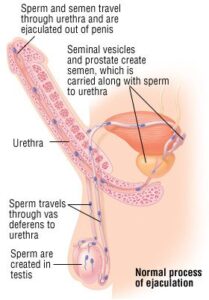Premature ejaculation is the most common form of male S**ual dysfunction, but its ubiquity in no way diminishes the distress it can cause men of all ages – nor the stigma that prevents many of them from approaching a medical professional for help and advice.
Doctors estimate that 20-30% of men, at least one in five, are affected by premature ejaculation (PE), yet a uniformly accepted medical definition remains elusive.
Put simply, PE is where a man ejaculates too quickly – generally defined as less than or within a minute of penetration – and sufferers tend to fall into two main categories: those with lifelong PE who have experienced premature ejaculation ever since becoming S**ually active, and those with acquired PE.
The latter, whereby a man suddenly experiences the condition, is more common and can be caused by various physical factors.
Physical causes
Research shows that men with an overactive thyroid (hyperthyroidism) are more likely to suffer from PE and that once the hyperthyroidism is treated the chances of experiencing it are reduced.
PE is also linked with chronic infection of the prostate, known as prostatitis, and successful treatment is proven to significantly increase the time it takes the patient to ejaculate. Another theory explores the potential link between PE and penile sensitivity caused by circumcision.
“One school of thought says that circumcision leads to less gland sensitivity and so it is better for PE, while the other argues that circumcision denu-d-es the penis, exposing the glands and resulting in a higher incidence of the condition,” says Tet Yap, consultant urologist at the Princess Grace Hospital, part of HCA Healthcare UK.
“Psychological factors have been implicated, whereby the sympathetic nervous system is activated by anxiety, resulting in an earlier emission of semen, which then triggers ejaculation.”
Psychological and emotional factors
In addition to anxiety, other psychological factors such as depression, stress, and childhood S**ual trauma are also thought to be linked to both lifelong and acquired PE.
“PE can start early in life as a result of being worried about S** or masturbation – either learning to masturbate quickly or never learning – or not experiencing S** that is more relaxed and managed differently,” says Peter Saddington, a practice clinical supervisor for Relate.
“If the condition manifests later in life, it can be because of anxiety over a new relationship, a difficult experience, illness or trauma. Anxiety is the key emotion that affects the condition.
Saddington believes that getting couples to experiment with different forms of touch could be key to treating PE.
“Exploring your partner’s body in a non-S.e.xual way can retrain the brain and body, as well as reducing anxiety,” he says.
Exposure to pornography may lead some men to have a skewed view of what constitutes ‘normal’ ejaculation. A study of 500 couples from five different countries found that the average time taken to ejaculate during intercourse was around five-and-a-half minutes, but it is important to remember every relationship is different, and that there are no hard and fast rules governing how long S** should last.
“A lot of men are more upset and worried than their partners,” says Saddington. “They can feel shame and embarrassment, and that their masculinity is being judged or evaluated by not being able to ejaculate as ‘other’ men.
“Overall, the biggest impact is likely to be an increase in anxiety and/or creating a subject that is taboo, and this is not healthy for a relationship.”
Boosting serotonin levels
The good news is that both the physical and psychological causes of PE are eminently treatable. Typically, a GP will start by asking the patient to complete a questionnaire about their S**ual history in order to find out if they are actually experiencing PE or worrying unnecessarily.
“PE is very common but it can sometimes be perceived as premature when in fact it is within a normal range,” says Saddington.
Hyperthyroidism is usually treated with a medication called carbimazole, radioiodine treatment, or surgery to remove some or all of the thyroid gland. A single episode of prostatitis, known as acute prostatitis, usually responds to a course of antibiotics: chronic prostatitis, diagnosed if the condition persists for at least three months, may respond to antibiotics but does sometimes need specialist referral.
Boosting levels of the hormone serotonin using antidepressants such as fluoxetine, and a drug called dapoxetine, is also thought to help patients with PE. It’s worth noting that dapoxetine is fairly new and isn’t always available through the GP.
“Selective serotonin reuptake inhibitors (SSRIs) delay ejaculation by increasing serotonin in the nervous system,” explains Yap. “We tend to trial patients on dapoxetine since it is shorter-acting and isn’t thought to cause as many side-effects, especially when stopping the medication. Similarly, 50 mg of the painkiller tramadol two hours before intercourse can also help by increasing the amount of serotonin in the nervous system.
“Another trend is to treat erectile dysfunction as a part of PE. Prescribing Viagra is still controversial, but we think it may reduce sympathetic tone and cause the smooth muscles in the genital system to relax, delaying one of the first steps that lead to ejaculation.
“No large term studies have been done, but in some trials, success rates on selected patients are high, around 60%.”
Can behavioural treatments help?
PsychoS.e.xual behavioural treatments are also proven to be useful in helping men experiencing PE.
For example, masturbation just before intercourse using a stop-start technique whereby the man’s partner delays orgasm, by stimulating his penis until he wants to ejaculate and then stops until the sensation passes, can be especially effective for younger men.
“The aim is to get to 15 minutes and slowly train your mind and body to cope with and manage the heightened levels of arousal,” explains Saddington.
Similarly, the Masters and Johnson ‘squeeze technique’ involves the partner applying pressure to the base of the head of the penis just before ejaculation.
Speak up
As with all S**ual problems, the first step is often the hardest; finding the courage to approach your GP or a S**ual health professional.
“Research shows that only 5% of men with PE actually think of presenting to a doctor and 70% of these men present with something else before eventually volunteering the information about PE to their doctor,” says Yap.
“For many men, if they have tried and not managed to make changes then I would strongly encourage them to seek a good S** therapist to get some support,” says Saddington.
Share This



